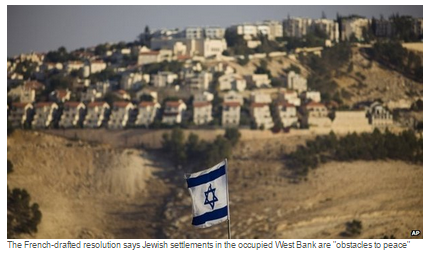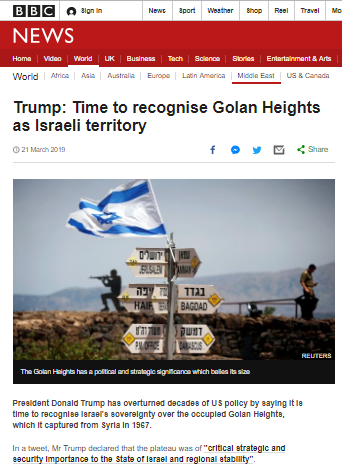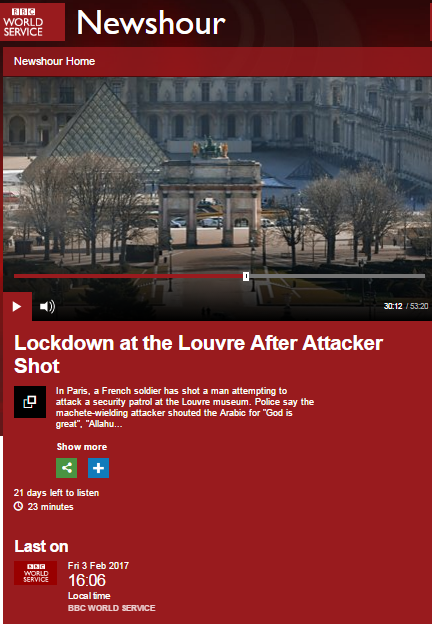Over the past few days, the BBC News website has produced three reports relating to the topic of the presentation of a draft resolution to the UNSC by council member Jordan on behalf of the Palestinian Authority on December 17th.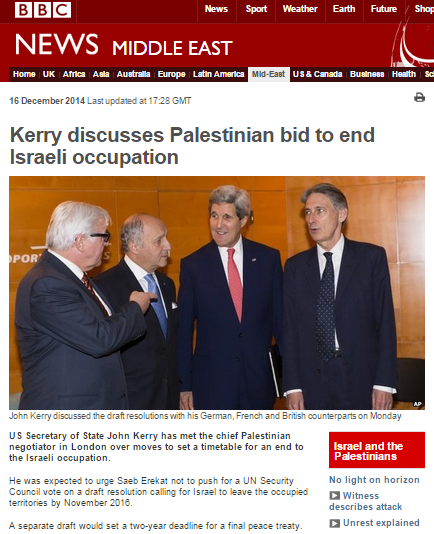
1) “Kerry discusses Palestinian bid to end Israeli occupation” – December 16th
2) “Palestinian draft peace plan put before UN Security Council” – December 18th
3) “Israel dismisses Palestinian peace deal plan as ‘gimmick’” – December 18th
Examination of these three reports shows that the BBC’s framing of the topic highlights specific issues whilst concealing others which are no less vital to audience understanding of the topic.
The issue of why this draft resolution was presented to the UNSC is addressed – briefly – only in the second article, where an insert of analysis by Yolande Knell informs readers that:
“Palestinian officials say their new initiative at the UN’s most powerful body marks a “strategic shift” in the way they’re dealing with Israel.
Earlier this week, former negotiator Mohammed Shtayyeh told journalists that armed struggle and more than 20 years of on-and-off bilateral talks had failed to secure an independent Palestinian state. “Now we are going in a completely different direction, which is the internationalisation of the issue,” he said.”
Audiences are not told what “internationalisation” actually is and neither are they made adequately aware of the fact that such unilateral moves on the part of the PA represent an attempt to sidestep the internationally accepted route of negotiations on final status issues and its efforts to seek an externally imposed arrangement instead. Relatedly, in all three reports readers are informed that: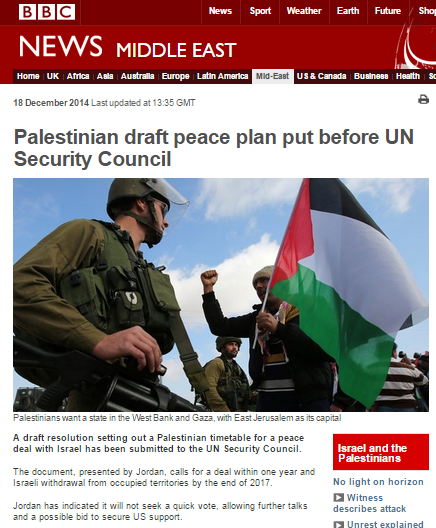
“Direct peace talks between Israel and the Palestinians brokered by the US collapsed in April.”
They are not, however, told that the reason for that collapse was the PA’s decision to form a unity government with the designated terror organization Hamas, in clear breach of the terms laid out by the Quartet, according to which:
“…all members of a future Palestinian government must be committed to nonviolence, recognition of Israel, and acceptance of previous agreements and obligations, including the Roadmap”.
Neither does the BBC address the issue of exactly which Palestinian factions are involved in this unilateral move and the significance of the fact that Hamas, whilst party to the Palestinian unity government, is not a member of the body recognized by the international community as representing the Palestinian people – the PLO. Hence, the subject of which factions exactly would be bound by what the BBC revealingly chooses to term this Palestinian “peace plan” – and its resulting efficacy – remains unaddressed.
Likewise, the fact that none of the officials supposedly representing the Palestinian people at the current time holds a valid elected mandate is, as ever, avoided.
Side by side with that superficial representation of the subject matter of these three BBC articles, we see an effort to frame the conflict in very narrow and specific terms. In the first of the three articles audiences are told that:
“Another draft resolution, being formulated by France, […] does not mention an Israeli withdrawal, but does lay out some of the parameters of a permanent deal, including using the ceasefire lines which separated Israel and the West Bank before the 1967 Six Day War as the basis for those of a future Palestinian state.” [emphasis added]
As has been pointed out here on numerous occasions, those 1949 ceasefire lines (in this case correctly described by the BBC) were specifically defined in the Armistice Agreement as not being borders. However, in the two later reports readers are misleadingly told with regard to the Jordanian draft resolution that: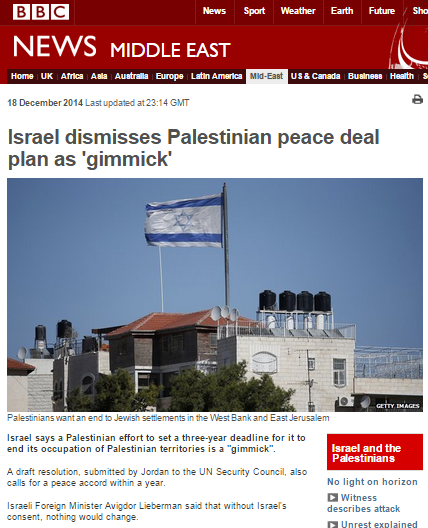
“The text of the draft says a negotiated solution should be based on several parameters including the boundary between Israel and the West Bank that existed before the 1967 Six Day War, security agreements, and “Jerusalem as the shared capital of the two states”.” [emphasis added]
In all three reports BBC audiences are steered towards a view of the conflict this draft resolution purports to address as being exclusively about “occupation” and “settlements”: for example:
“US Secretary of State John Kerry has met the chief Palestinian negotiator in London over moves to set a timetable for an end to the Israeli occupation.” (report 1)
“A previous draft of a Palestinian proposal that was circulated informally to the security council in October called for an end to Israeli occupation of Palestinian land by November 2016. However, the US and others found the text unacceptable.” (report 2) [emphasis added]
“It [the draft text] urges both parties “to abstain from any unilateral and illegal actions, including settlement activities, that could undermine the viability of a two-state solution”.” (report 3)
That messaging is also reinforced through the use of images and their captions.
“The French-drafted resolution says Jewish settlements in the occupied West Bank are “obstacles to peace”.”
“Palestinians want an end to Jewish settlements in the West Bank and East Jerusalem”
“Settlement building has led to clashes between Israeli forces and Palestinian protesters”
Issues such as the demand for the ‘right of return’ for Palestinian refugees and Palestinian terrorism – both of which appear in the Jordanian presented draft resolution – are not mentioned or addressed in any of these BBC reports, meaning that audiences are herded towards a narrow view of the conflict which focuses exclusively upon Israeli actions, erasing any mention of Palestinian actions or policies prolonging the conflict. Thus, the ability of audiences to comprehend the conflict as a whole is hampered and they are deprived of the comprehensive background crucial to their understanding of this latest unilateral act by the PA and any future developments connected to it.
Once again, the BBC’s politically motivated framing of a topic has been allowed to trump its obligation to provide audiences with the complete range of information which will allow them to fully comprehend international issues.

